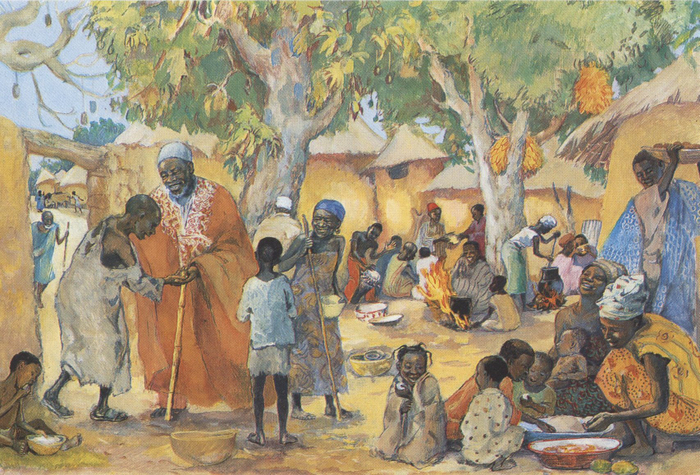
The poor invited to the feast
JESUS MAFA, 1973
My dear friends,
Today, let us reflect upon Luke 14:1, 7-14, a text from the Christian tradition that carries profound wisdom applicable to all of humanity, speaking to the virtues of humility and generosity.
In this passage, we find Jesus invited to the house of a Pharisee, a leader of his time, to share in a meal on the Sabbath. As he entered, he observed how the guests eagerly sought the places of honor at the table. This sight prompted him to share a parable, one that carries a message transcending the boundaries of any particular faith.
Imagine, my friends, that you are invited to a grand wedding banquet. The allure of the seats of honor is undeniable, for they symbolize prestige and recognition. Yet, Jesus advises us differently. He encourages us to choose the lowest place at the table. Why? Because when we humble ourselves and take the lowest seat, the host may notice and invite us to move up higher. By doing so, the host honors us in the presence of all. It is a powerful reminder that those who exalt themselves will be humbled, while those who humble themselves will be exalted.
This lesson from Jesus invites us to examine our hearts and actions. In our world, so often obsessed with status and ego, it calls us to reevaluate our motivations. When we act with humility, without seeking recognition or accolades, we open our hearts to true spiritual growth. It is a path that allows us to transcend the limitations of our ego and connect with the genuine essence of our humanity.
But there is more to this teaching. Jesus goes on to speak about the importance of generosity. He urges us not to invite only our friends, relatives, or those who can repay us when we host a gathering. Instead, he encourages us to invite those who are often marginalized: the poor, the crippled, the lame, and the blind. In doing so, we share our love and abundance without any expectation of return.
In this, we find a profound parallel with the Buddhist concept of dana, the act of giving without expecting anything in return. When we extend our generosity to those who cannot repay us, we sow the seeds of compassion and create a more harmonious world. This generosity, Jesus tells us, is a true blessing, for it extends beyond the material realm. It transcends this life and promises a reward at the "resurrection of the righteous."
My friends, we can all draw inspiration from these teachings, regardless of our faith tradition. Let us strive to embrace humility, to avoid seeking the highest seat at the table of life, and to practice boundless generosity, especially to those in need. In doing so, we contribute to the well-being of all beings and find our own hearts enriched with the blessings of compassion.
May these teachings guide us on the humble path of love, compassion, and understanding, transcending the boundaries that too often divide us. May we all be blessed with the wisdom to embody these virtues in our lives.